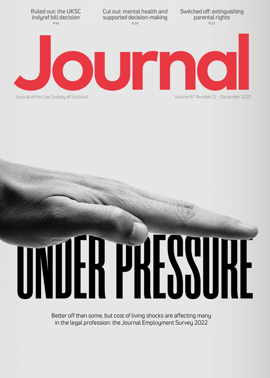Mental health: a blueprint for reform

The Scottish Mental Health Law Review (“SMHLR”) issued its final report on 30 September. Established by Scottish ministers in March 2019, the SMHLR was chaired by John Scott KC (now Lord Scott). We supported him in the executive team alongside Graham Morgan, Karen Martin and Alison Rankin, who brought lived experience of mental illness and a background in campaigning and advocacy. Karen Martin is also a member of the Mental Health Tribunal for Scotland.
The Review’s terms of reference set out that its principal aim was “to improve the rights and protections of persons who may be subject to the existing provisions of mental health, incapacity or adult support and protection legislation as a consequence of having a mental disorder, and remove barriers to those caring for their health and welfare”.
It was asked to consider what reforms might be needed to ensure mental health and capacity law gives full effect to the human rights of people affected by it.
Background
The Adults with Incapacity (Scotland) Act 2000 (“AWI”) and the Mental Health (Care and Treatment) (Scotland) Act 2003 were world leading when introduced, but there have been significant developments since then.
Some of the safeguards in the law have become less effective as a result of resource constraints and the rising number of people subject to mental health detention and guardianship. There is concern that the process for authorising moves into care homes for people who cannot consent breaches the European Convention on Human Rights. The Scottish Government has committed to incorporating a series of human rights instruments into domestic law, including the International Covenant on Economic, Social and Cultural Rights (“ICESCR”) and the UN Convention on the Rights of Persons with Disabilities (“CRPD”). The CRPD in particular presents a radical challenge to the current model of mental health and capacity law.
Key themes of the Review
The final report from the Review runs to almost 1,000 pages, with more than 200 recommendations. These can be grouped into the following broad themes:
- strengthening the voice of people who use services and of those who care for them;
- reducing the need for coercion in the system;
- securing rights to the help and support needed to live a good life.
Stronger voice
The CRPD affirms that “persons with disabilities enjoy legal capacity on an equal basis with others in all aspects of life”, and that “States parties shall take appropriate measures to provide access by persons with disabilities to the support they may require in exercising their legal capacity”.
The implications of this for mental health and capacity law remain controversial, but the Review is clear that much more must be done to ensure that people with mental and intellectual disabilities are able to exercise meaningful control over their own lives.
It recommends that the Scottish Government should develop a comprehensive scheme of supported decision making, including better access to individual advocacy. It also recommends the development of advance choices, to allow people to set out their wishes should they be unable in future to make decisions for themselves. (The Law Society of Scotland has also made proposals in this area: Advance choices, and medical decision-making in intensive care situations.) The Review proposes replacing the tests of incapacity and “significant impairment of decision-making” in the AWI and Mental Health Acts respectively with a new test of autonomous decision-making.
Alongside strengthening the voice of the individual, the Review calls for the development of collective advocacy: organisations of and for people with mental and intellectual disabilities who can have a strong voice in the development of services, and the ability to challenge failures to live up to a human rights approach.
Reduced coercion
The Review accepts that it is sometimes essential to detain someone or require them to accept treatment they do not want, but argues that much more can be done to reduce coercion. Its recommendations include greater safeguards for measures such as restraint or seclusion, alongside practical steps such as improved training and the development of new crisis services to reduce the need for emergency detention.
The 2003 Act provides that patients in high and medium secure hospitals can appeal to the Mental Health Tribunal if the level of security they are subject to is not justified. The Review proposes that this be widened so that any detained patient can appeal against the level of restriction they experience.
Many practitioners will already be familiar with the concerns around deprivation of liberty. The UK Supreme Court made clear in P v Cheshire West [2014] UKSC 19 at para 49 that anyone who is “under continuous supervision and control and not free to leave”, and who cannot consent to this, has been deprived of their liberty under article 5 ECHR and is therefore entitled to article 5 safeguards. This applies to thousands of people in hospitals, care homes and other settings.
Article 5 jurisprudence has stated that there must be practical and effective means available to enable persons with mental and intellectual disabilities to challenge the lawfulness of a deprivation of liberty. It is by no means clear that this is the case where a deprivation of liberty has been authorised by a welfare guardian, although the Scottish courts have accepted guardianship as sufficient authority to place someone who cannot consent in a care home.
In any event, welfare guardianship can take several months, and the Society has criticised long delays in obtaining the necessary social work reports. This can lead to people being kept in hospital for long periods. Attempts by some health and social care authorities to find ways round this have also been criticised as ignoring the rights of adults with incapacity, including one case where the Equality & Human Rights Commission judicially reviewed an NHS board.
Welfare powers of attorney are also used to authorise care home placements, but there is even more debate as to whether this process has sufficient safeguards to meet the requirements of article 5. And, of course, they cannot be used if the adult has already lost capacity before the power can be granted.
The Review proposes a number of ways to address this, including:
- the development of supported decision making, which should enable more people to give a clear indication of their wishes in relation to care;
- clarification that a power of attorney can be used to consent to a deprivation of liberty, subject to a right of review and independent oversight;
- a new “standard order for deprivation of liberty”, which could be made by a court or tribunal, with, where necessary, an urgent order to avoid serious harm to the individual.
Stronger rights
One of the fundamental recommendations is that there should be a new purpose for mental health and capacity law. Currently, the law largely regulates “negative” human rights – like the right not to be detained without a lawful process, and the right to bodily autonomy and to refuse medical treatment.
The Review argues that the law should ensure that all the human rights of people with mental or intellectual disabilities are protected and fulfilled. This includes positive human rights, such as the right to the highest attainable standard of physical and mental health (ICESCR, article 12) and the right to independent living (CRPD, article 19).
It proposes that decisions about the care and support a person receives should be informed by a full appreciation of that person’s human rights. It calls this process “human rights enablement”.
This is intended as a framework which will encompass existing assessment processes.
This would be linked to the development by the Scottish Government of “minimum core obligations” in relation to human rights, alongside a commitment to “progressive realisation”, which ensures that realisation of rights improves over time. The Review proposes that there should be legal remedies where minimum core obligations are not met. This would include a strengthening of the “recorded matters” provisions in the Mental Health Act. There would also be the possibility of legal action by the Mental Welfare Commission in the event of a systemic failure to secure the human rights of a particular group.
What next?
The Review is being considered by ministers. Some reform, particularly in relation to deprivation of liberty, is urgent, and may need to proceed in advance of comprehensive implementation of the Review. The Court of Session has also recently held that the Mental Health Act breaches ECHR, because the Mental Health Tribunal cannot make a recorded matter in respect of a patient subject to a compulsion order (a forensic mental health disposal following a criminal conviction) in the way it can for a civil patient: X v Mental Health Tribunal for Scotland [2022] CSOH 78. This will require remedial action.
There are technical recommendations which could be implemented quickly, including improvements to the named person and curator ad litem, and a recommendation that intermediaries should be available in the criminal courts to support accused persons with mental and intellectual disabilities.
Other measures will take longer, and require further engagement. The Review wants to see greater alignment between mental health and capacity law. It supports the Society’s view that the judicial forum for both Acts should be a tribunal, but recognises that this will take time to achieve.
In many ways, the debate about reform has just begun.
Perspectives
Features
Briefings
- Criminal court: Farewell retrospective
- Agriculture: A future support framework
- Corporate: Is there a creditor duty?
- Intellectual property: "Reclaiming the UK statute book"
- Sport: Flouting their own rules?
- Succession: Crofting tenancy transfers in intestacy
- Scottish Solicitors' Discipline Tribunal: December 2022
- Property: Conveyancing – the future is in our hands
- In-house: With a fair wind







